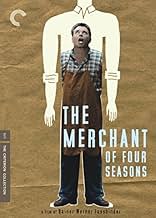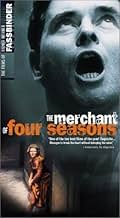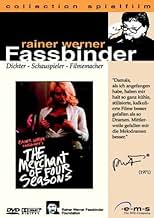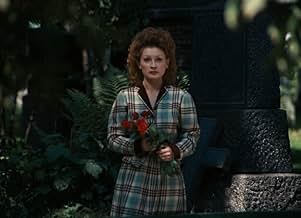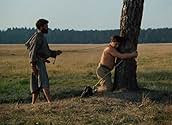IMDb RATING
7.3/10
5.6K
YOUR RATING
Hans Epp is a self-destructive man who lives a dissatisfied life. He tries to find meaning as a fruit vendor, but a heart attack impedes his ability to work, which turns his dissatisfaction ... Read allHans Epp is a self-destructive man who lives a dissatisfied life. He tries to find meaning as a fruit vendor, but a heart attack impedes his ability to work, which turns his dissatisfaction into despair.Hans Epp is a self-destructive man who lives a dissatisfied life. He tries to find meaning as a fruit vendor, but a heart attack impedes his ability to work, which turns his dissatisfaction into despair.
- Director
- Writer
- Stars
- Awards
- 3 wins & 5 nominations total
Walter Sedlmayr
- Fruit cart salesman
- (as Walther Sedlmayer)
El Hedi ben Salem
- The Arab
- (as Salem El Heïdi)
- Director
- Writer
- All cast & crew
- Production, box office & more at IMDbPro
7.35.6K
1
2
3
4
5
6
7
8
9
10
Featured reviews
The human spirit crushed
I didn't find this film as accessible as 'Fox & his Friends' but it was a moving portrayal of a typical Fassbinder victim figure, the eponymous barrow-boy, Hans Epp, whose hopes and dreams are eventually crushed by stultifying conformity (family & society). Some of the scenes are exaggerated (the family confrontations) but I particularly liked the sequence where Hans is desperately searching for meaning & comfort; he tries to find some peace in natural surroundings, goes back to his first lost love in order to recapture past feelings (she's only interested in a quick fling before her husband returns) and visits his sister, perhaps the only person who has any degree of sympathy for him, only to find she's too busy with work.
A poignant story of a vulnerable inarticulate man crushed by his mundane surroundings and bourgeoise, middle-class German values obsessed with economic success and a upward mobility that conveniently papers over the cracks of its more disturbing past.
A poignant story of a vulnerable inarticulate man crushed by his mundane surroundings and bourgeoise, middle-class German values obsessed with economic success and a upward mobility that conveniently papers over the cracks of its more disturbing past.
A Man of Poor Reason.
The Merchant of Four Seasons is prolific, self destructive, German, writer, director Rainer Werner Fassbinder's first film that brought him international attention along with the movement called New German Cinema. Specializing in melodramas he managed to churn out 44 films before dying from a drug overdose at 37, Merchant being one of his finer efforts.
Hans Epp returns from a stint in the Foreign Legion to a cold mother and detached family. Once a proud policeman, drummed out of the force, he resorts to pedaling fruit from a cart and begins to make a reasonable living. Alcoholism, however dogs him and brings him to dark places.
Fassbinder was a follower of Hollywood director Douglas Sirk and the artifice contained in his colorful melodramas featuring Rock Hudson and a vivid palette. Fassbender does so as well here with some outstanding compositions that moodily jump out at you but his characters (played with a cornered desperation by Hans Hirshmuller and sullen resignation by Irm Hermann ) remain more complex in their take on matters made even more impenetrable by their stoicism.
Uncompromising in its dark viewpoint, a bleak but rewarding watch.
Hans Epp returns from a stint in the Foreign Legion to a cold mother and detached family. Once a proud policeman, drummed out of the force, he resorts to pedaling fruit from a cart and begins to make a reasonable living. Alcoholism, however dogs him and brings him to dark places.
Fassbinder was a follower of Hollywood director Douglas Sirk and the artifice contained in his colorful melodramas featuring Rock Hudson and a vivid palette. Fassbender does so as well here with some outstanding compositions that moodily jump out at you but his characters (played with a cornered desperation by Hans Hirshmuller and sullen resignation by Irm Hermann ) remain more complex in their take on matters made even more impenetrable by their stoicism.
Uncompromising in its dark viewpoint, a bleak but rewarding watch.
Realistic and hateful; an excellent portrayal of depression
The Merchant of Four Seasons is a film about a lack of love. The film starts off with the main character; Hans Epp, returning from a spell in the foreign legion. He returns to his mother, not to be told how much she loves him, or how much she's missed him; but to be told that he is worthless and, even worse, that she would have preferred the man he went with to have come back instead. It is the character's relation to women that makes this film so hateful; the fact that his wife is taller than him is symbolic of his relation to the other gender; he is consistently humiliated by them, and it is through his relations with them that his life isn't as great as it could have been. This is also shown clearly by the way he treats his wife after a drink. He lost his job as a policeman through lust for a woman, and even his wife; a woman that is supposed to love him, never really shows any affection for him. Even at the end, his wife is more bothered about what her and her daughter will do than the state of her husband.
The Merchant of Four Seasons is a thoroughly unpleasant film. There isn't a scene in the movie where someone is happy, and not only that; but the movie seems deliriously blissful to wallow in the misery of it's central characters. The movie is certainly not recommended to anyone who is currently having a hard time, that's for sure. Despite all the misery, the film never steps out the bounds of reality; every event in this movie can - and most probably has - happened, and that only serves in making the movie more shocking. The film is, of course, helmed by Rainer Werner Fassbinder; the cult German director that committed suicide in 1982. This is only my second taste of the man's work, but through just two films, it is easy to get an idea of the type of art that he creates. Both films are downtrodden and gritty - yet realistic pieces of art. His characterization in this movie is subtle; we only ever get to know the characters through their plight's and not through their character. This is a very clever way of showing the audience that it is their surroundings that define the people in the film, not the people themselves - and as nearly everyone that sees the film knows what living in an urban society is like, it wont difficult for the majority of people to relate to.
The Merchant of Four Seasons is not a film that is easily forgettable; the movie is high on substance and low on style, and that makes for a very memorable picture, and one that everyone who considers themselves to be a fan of cinema should experience. It is with that in my mind that I give this film my highest recommendations; it's not sweet and it's not pleasant, but you will not see a more realistic portrayal of depression, and this is most certainly a movie that will stay with you.
The Merchant of Four Seasons is a thoroughly unpleasant film. There isn't a scene in the movie where someone is happy, and not only that; but the movie seems deliriously blissful to wallow in the misery of it's central characters. The movie is certainly not recommended to anyone who is currently having a hard time, that's for sure. Despite all the misery, the film never steps out the bounds of reality; every event in this movie can - and most probably has - happened, and that only serves in making the movie more shocking. The film is, of course, helmed by Rainer Werner Fassbinder; the cult German director that committed suicide in 1982. This is only my second taste of the man's work, but through just two films, it is easy to get an idea of the type of art that he creates. Both films are downtrodden and gritty - yet realistic pieces of art. His characterization in this movie is subtle; we only ever get to know the characters through their plight's and not through their character. This is a very clever way of showing the audience that it is their surroundings that define the people in the film, not the people themselves - and as nearly everyone that sees the film knows what living in an urban society is like, it wont difficult for the majority of people to relate to.
The Merchant of Four Seasons is not a film that is easily forgettable; the movie is high on substance and low on style, and that makes for a very memorable picture, and one that everyone who considers themselves to be a fan of cinema should experience. It is with that in my mind that I give this film my highest recommendations; it's not sweet and it's not pleasant, but you will not see a more realistic portrayal of depression, and this is most certainly a movie that will stay with you.
All Pigs
The Merchant of Four Seasons received all major W German film awards for 1971 but it took a couple of more years for Fassbinder to break through internationally. TM4S is a fairly simple story but it can be difficult or painful to watch due to the subject matter: class prejudices, domestic violence, infidelity, family discord, depression and self-destructive behavior. In other words it presents a bleak view of the world and its human inhabitants. I believe there's an undercurrent of cutting humor throughout although it's interesting that no examples spring to mind and it's not campy. I saw TM4S in the mid-70s and in 2015 didn't remember much at all (other than not liking it), which suggests I repressed a lot that first time. I now think it's the first of a few masterpieces by a director whose importance will certainly endure.
Mr. Self Destruct
THE MERCHANT OF FOUR SEASONS was Rainer Werner Fassbinder's first shot at mainstream acceptance. In a turbulent career of just fifteen years, he managed to create an astounding body of work in film and theater, both as a performer and a creative producer, actor, and director. Although this movie might not appeal to many viewers, the film has much to offer. The storyline is fairly straightforward. A man is ostracized from his upper middle class family due to emotional and economic problems, and proves unable to control his downward spiral. THE MERCHANT OF FOUR SEASONS is shot with a slavish devotion to elegant detail, and each set is very carefully designed and constructed. Every object on set seems painstakingly arranged so as to provoke layers of emotional texture. Many religious paintings and icons decorate the walls of the various rooms and seem to speak to Hans's desperate quest for spiritual meaning or direction in his life. Much thought was given to how lighting and color were employed to contrast and enhance the drama. Several times during the film, I froze the frame to marvel at the beauty of the shot's composition. I streamed this film, and the print was nearly flawless and second to none. Fassbinder employs his actors in an almost vehement "Anti-Natural' style. He does everything possible to prevent the actors from reacting in a normal or colloquial manner, and this creates a rather stilted effect. However, by doing so, he injects an almost 'hyper-reality' to the narrative. Rather than the presentation of a mundane melodrama, the actors almost militant lack of affectation forces the viewer to confront the film in a different manner. Fassbinder's film intentionally prevents the viewer from easily connecting with the characters' trials and tribulations. You are constantly on the outside, looking in. This will be a disconcerting experience for many, but I found it to be a unique and satisfying artistic adventure.
Did you know
- TriviaAndrea Schober's debut.
- ConnectionsFeatured in Sehnsucht nach Sodom (1989)
- How long is The Merchant of Four Seasons?Powered by Alexa
Details
- Release date
- Country of origin
- Languages
- Also known as
- Händler der vier Jahreszeiten
- Filming locations
- Production company
- See more company credits at IMDbPro
Box office
- Budget
- DEM 325,000 (estimated)
- Gross US & Canada
- $8,144
- Opening weekend US & Canada
- $11,623
- Feb 16, 2003
- Gross worldwide
- $8,408
Contribute to this page
Suggest an edit or add missing content



